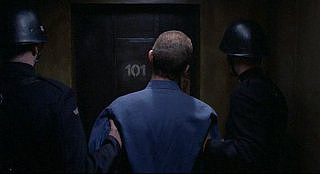“The Times article, based on information from former intelligence officers who spoke on condition of anonymity, said Abu Zubaydah had revealed a great deal of information before harsh methods were used and after his captors stripped him of clothes, kept him in a cold cell and kept him awake at night. The article said interrogators at the secret prison in Thailand believed he had given up all the information he had, but officials at headquarters ordered them to use waterboarding.” Perusing last week’s sordid torture memos, eagle-eyed blogger Marcy Wheeler discovered an unsettling statistic: two suspects — Abu Zubaydah and Khalid Shaikh Mohammed — were waterboarded by the CIA 266 times. Zubaydah “revealed no new information after being waterboarded, the article said, a conclusion that appears to be supported by a footnote to a 2005 Justice Department memo saying the use of the harshest methods appeared to have been ‘unnecessary’ in his case.“
Meanwhile, as right-wing stooges like former CIA director Michael Hayden and Mike Allen’s anonymous friend excoriate the president for breaking tradition and revealing the illegalities of the Dubya era, Chief of Staff Rahm Emanuel ventured onto the Sunday shows to tamp down talk of any prosecutions, even for the higher-ups. “[P]eople in good faith were operating with the guidance they were provided. They shouldn’t be prosecuted…those who devised policy, he [Obama] believes that they were — should not be prosecuted either, and that’s not the place that we go — as he said in that letter.“
Wrong answer, Rahm. And, unless President Obama were to grant full pardons to the architects of Dubya-era torture, it’s not even his call whether or not they should be prosecuted. In fact, choosing not to prosecute them would constitute a violation of international law.
Update: The White House doesn’t necessarily agree with Rahm. “[A]dministration officials said Monday that Mr. Emanuel had meant the officials who ordered the policies carried out, not the lawyers who provided the legal rationale. Three Bush administration lawyers who signed memos, John C. Yoo, Jay S. Bybee and Steven G. Bradbury, are the subjects of a coming report by the Justice Department’s ethics office that officials say is sharply critical of their work. The ethics office has the power to recommend disbarment or other professional penalties or, less likely, to refer cases for criminal prosecution.“
Update 2: “With respect to those who formulated those legal decisions, I would say that that is going to be more of a decision for the attorney general within the parameters of various laws, and I don’t want to prejudge that.” President Obama opens the door further for prosecution.



